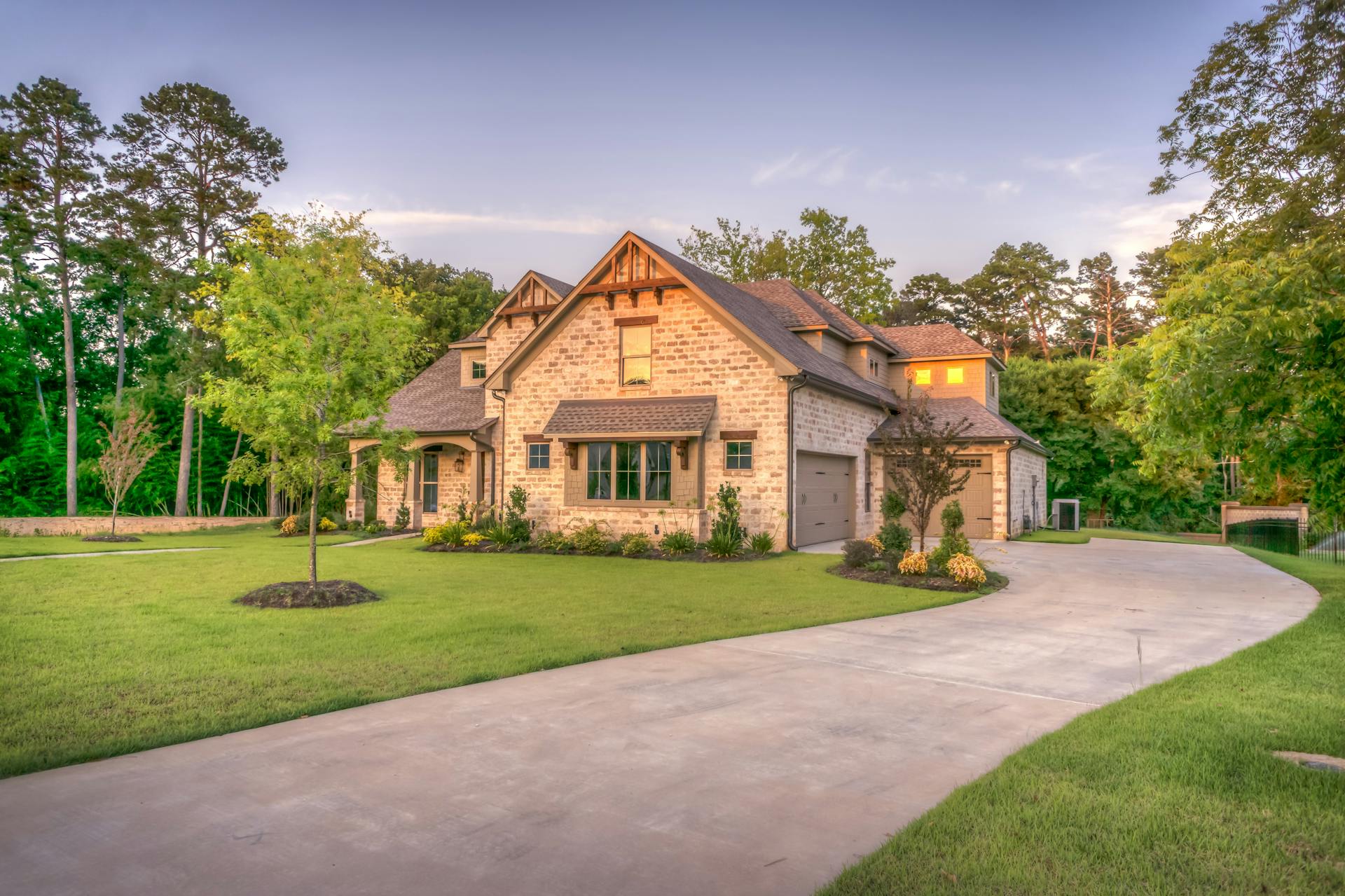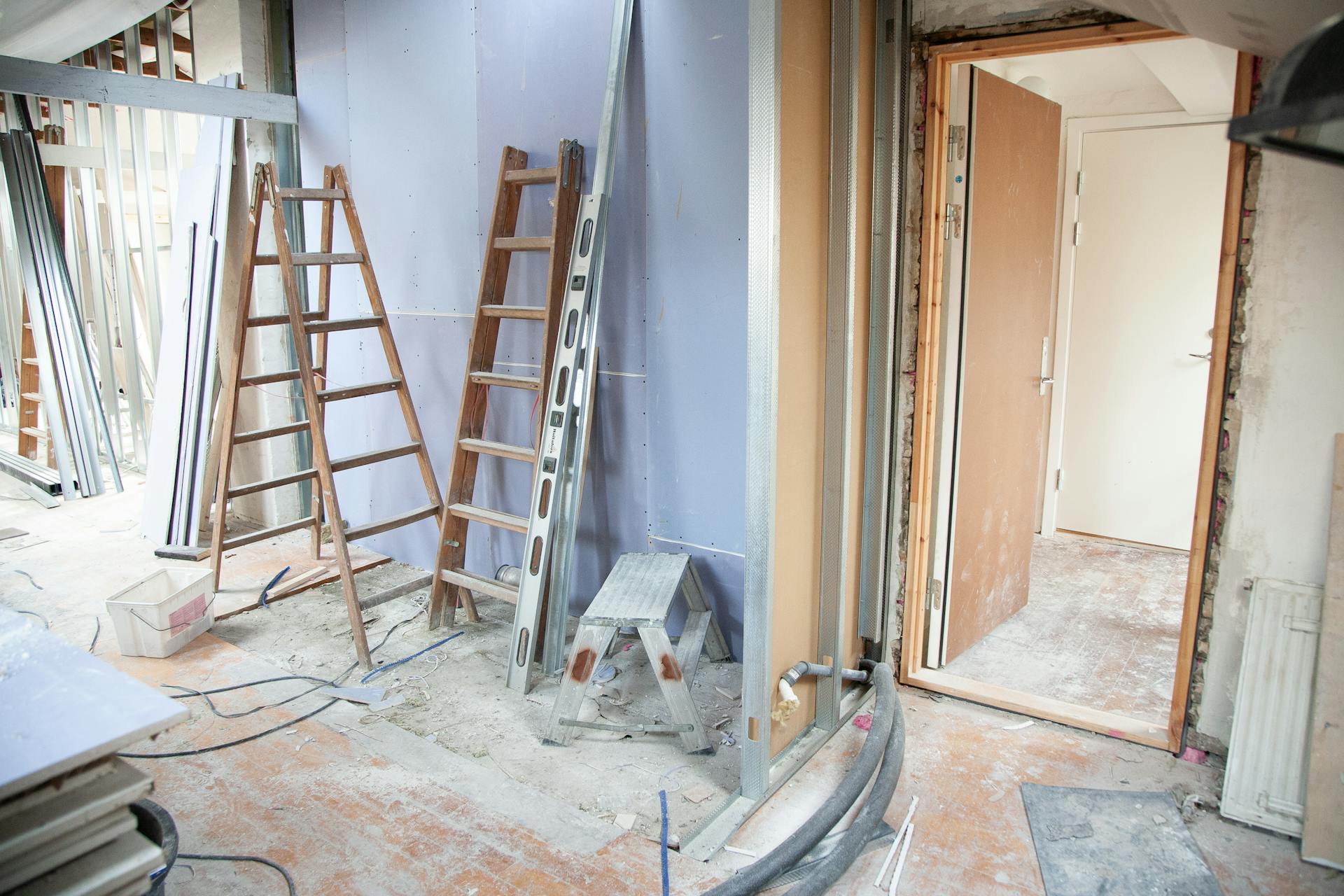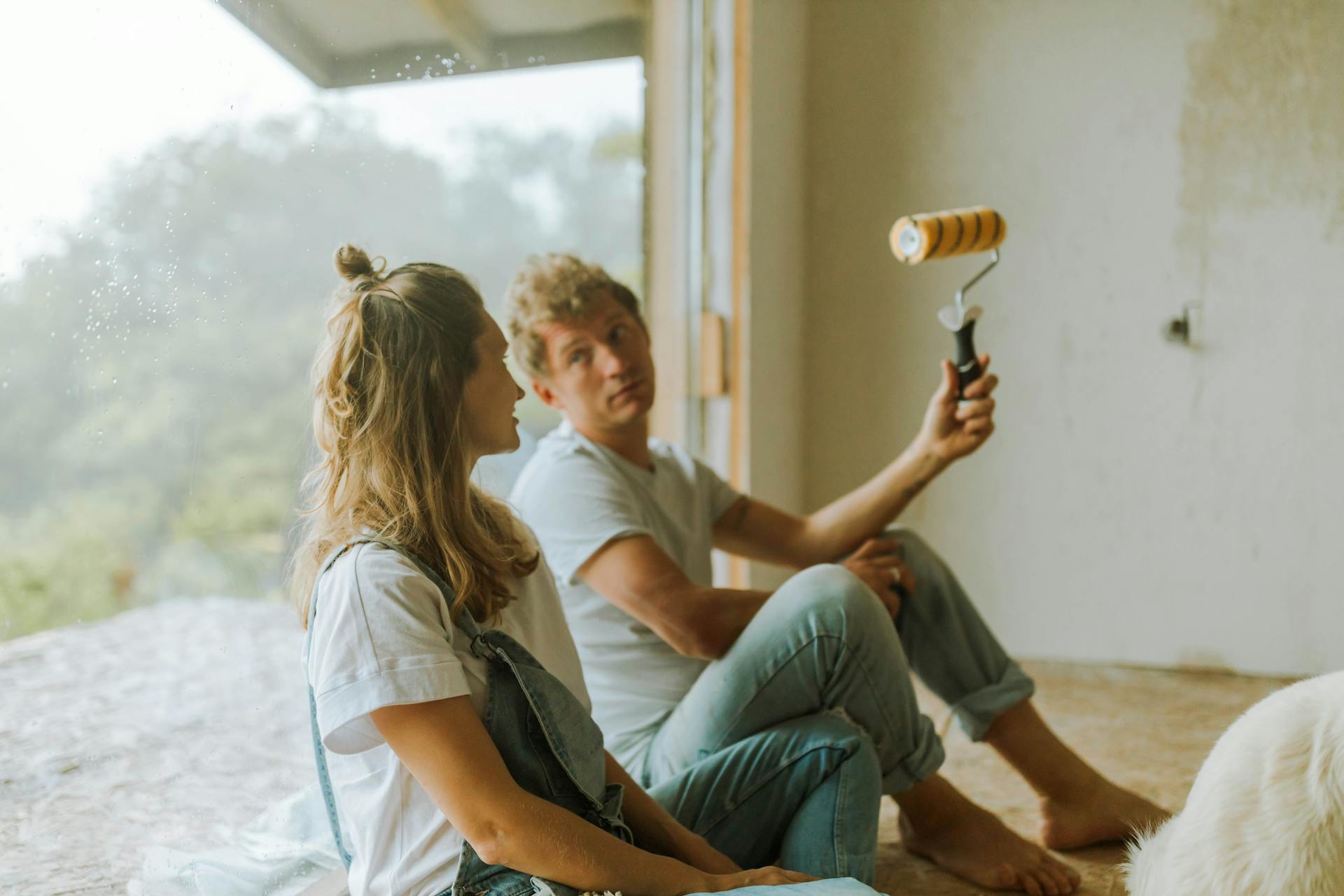
Flipping houses can be a lucrative business, with some investors making up to 20% profit in a single year, but it requires a significant amount of capital and expertise.
To flip a house, you need to purchase a property, renovate it, and then sell it for a higher price. The median renovation cost is around $20,000, which can be a substantial upfront expense.
Flipping houses can be a hands-on process, requiring investors to handle everything from finding the right property to managing contractors and dealing with unexpected setbacks. In contrast, renting properties can be a more passive investment, generating steady income with less hands-on involvement.
Renting properties can provide a consistent stream of income, with average annual returns ranging from 8-12%, making it a more stable option for some investors.
Investing Techniques
Investing in real estate can be a lucrative venture, but it requires careful consideration of the market and your financial situation. A property's worth can fluctuate significantly over time, as seen in the example of a rental property in Colorado that increased in value from $113,000 to $300,000 in just six years.
The market you're in can greatly impact your ability to buy rentals that cash flow. If prices increase too much, it may not be feasible to make a profit from renting. This is why it's essential to carefully evaluate the local market before investing.
Flipping houses can be a more feasible option, especially if you have the capital to invest. However, it requires a significant upfront investment and a willingness to take on the risks associated with renovation and resale. A flipper needs to be able to invest large sums upfront and manage their finances well to succeed.
The worst-case scenario for a rental property may be that it doesn't rent out quickly or that tenants damage the property. In contrast, a flipper who encounters a worst-case scenario may face significant financial troubles after just one poor investment decision.
To determine which investment method is right for you, ask yourself these questions:
- Do I have enough capital to flip?
- What happens if I encounter the worst-case scenario?
- Do I work well under stress, enjoy hard work, and manage my finances particularly well?
Ultimately, the decision to flip houses or rent properties depends on your personal financial situation, risk tolerance, and investment goals.
Benefits and Options
Flipping houses can be a lucrative way to make a living, but it's a lot of work and requires constant deal-finding to make more money.
You can make a lot of money flipping houses, but it's not always a straightforward investment. Flipping is more like a job that requires ongoing effort to find new deals.
Having more financing options is a significant advantage of flipping houses. You can use private money, hard money, bank money, and partners to finance flips, which is not always the case with rental properties.
Hard money loans are often used in flipping due to their quick approval times, but they come with higher interest rates.
Benefits of
House flipping can be a lucrative venture, but it's not for the faint of heart. You can make a lot of money flipping houses, but it's also a lot of work.
One of the biggest advantages of flipping houses is the potential for quick returns. House flipping appeals to investors for a multitude of reasons, and one of them is the promise of fast profits.

With experience, you can develop a keen eye for spotting undervalued properties and turning them into profitable flips. I've been flipping houses for 17 years and have learned to navigate the process with ease.
Flipping houses can provide a steady income stream, which is essential for investors like me who need to fund other real estate ventures, such as buying rentals. Rentals can be expensive to buy, so flipping houses helps me cover those costs.
More Options
You can make a lot of money flipping houses, but it's also a lot of work. Flipping houses can provide an income that you can use to buy more rentals. The more rentals you have, the more money you can make, but it's not always easy to find financing options.
You have more options to finance flips than you do rental properties. This is because you're holding flips for a short period of time, usually one or two years. You can use private money, hard money, bank money, and partners to flip houses, which is not always the case with rental properties.
Hard money loans are often used in flipping due to their quick approval times, but they come with higher interest rates. These loans are short-term, interest-only loans that can be a good option for flippers.
Cost and Comparison
Flipping a house can be a costly endeavor, with repairs and financing adding up quickly. It can take three months or more for a flip to sell after it's repaired and put on the market.
The costs of a flip are usually more because it takes longer to sell a home than it does to rent a home. Many times, a renter is ready to move in immediately and pay rent and a deposit right away.
Every day that a flipped house sits vacant, the owner is paying interest to the bank or hard money-lender and losing profits. This can be a significant financial burden.
You may not get the money back you invest in a rental right away, but you will be collecting rent. It can take a while to recoup your costs unless you refinance the property.
Market and Location
The market and location of your investment can make or break your success. A 40-mile radius is a good distance to buy fix and flips, while rental properties should be within 10 miles of where you live. I've found that buying rentals closer to home is key.

The local real estate market is a crucial factor in deciding whether to flip or rent. A comprehensive market analysis should be done to determine which route to go. I stopped buying residential rentals in my market because prices increased too much for rents to keep up.
Neighborhood characteristics can significantly affect property values and rental demand. For example, schools and amenities can boost property values, while crime rates and future development plans can deter potential buyers and renters.
Location
I primarily buy fix and flips within a 40-mile radius of where I am located. This is because I'm selling them quickly and I'm only concerned with when they will sell and for how much.
With rental properties, I need to think about the long-term prospects of the area I am buying in, the future economy and the rental market. I buy rental properties within 10 miles of where I live, although I prefer them to be much closer.
I also buy house flips in small towns with less than 5,000 people. As a real estate agent, it is easy for me to determine the values on houses. Figuring rental rates is much tougher, especially in small towns.
Small towns are also the hardest hit when the market goes down or vacancies go up. This is why I don't buy rentals in them.
The specifics of the neighborhood - from schools and amenities to crime rates and future development plans - can significantly affect property values and rental demand.
Appreciation
Appreciation is a key aspect of investing in real estate, and it's essential to understand how it works. The value of a rental property will most likely go up over time, making it a nice bonus for investors.
The average timeframe for flipping a house is around six months, which is significantly shorter than the timeframe for a rental property. This means that rental properties have a longer period to appreciate in value.
Property appreciation is highly likely to increase in value, and this means that when you choose to sell, you can potentially profit not only from the property's appreciation but also from the rental income you've earned on it as well.
Financial and Tax Implications
Flipping houses can be a lucrative venture, but it comes with its own set of tax implications. Profits from flipping are typically treated as ordinary income, so you'll likely pay at your standard tax rate.
However, if you flip houses frequently, you may be considered a dealer, which could lead to self-employment taxes. In fact, the self-employed pay the highest income taxes, as much as 43%.
Short-term capital gains tax rates can be a major concern for flippers, as they're based on your earned or "ordinary" income. This means you can expect to pay a higher tax rate if you sell a property within a year of buying it.
On the other hand, rental properties offer tax advantages, including deductions for mortgage interest, property taxes, operating expenses, depreciation, and repairs. You can also depreciate the structure, which means you can lose money on paper but make money in reality.
Generate Cash
You can generate cash with rentals like you can with flips. According to Example 5, with the BRRR strategy, you can refinance an investment property for 75% of its value, and get almost all of your money back out of the house.
The BRRR strategy has become very popular with real estate investors. You can usually refinance an investment property for 75% of the value of the property, and use that money to buy more rentals or flip another house.
House flipping provides an income that you can use to buy more rentals, as mentioned in Example 3. The faster you can flip a house, the greater return on investment (ROI) potential, according to Example 4.
Flipping a house can be a quicker way to generate cash compared to buying a rental property. The average timeframe on a house flip is around six months, which is much shorter than the time it takes to build equity in a rental property.
You can use flips to generate cash for a rental property, as suggested in Example 6. By flipping a house first, you can use the money to buy-and-hold another property as a rental.
Rental real estate investing can provide a regular, stable income stream, as mentioned in Example 9. Renting a property provides a steady cash flow, and the longer you hold onto your rental property, the more equity you build.
Tax Implications
Tax implications of real estate investing can be complex, but understanding the basics can help you make informed decisions.
Profits from flipping houses are typically treated as ordinary income, so you'll likely pay taxes at your standard rate. This can be a significant burden, especially if you're considered a dealer and subject to self-employment taxes.
Rental income, on the other hand, is also taxable, but landlords can take advantage of numerous deductions. This can help offset the tax liability and increase cash flow.
Depreciation is a key tax benefit for rental property owners, allowing you to deduct a portion of the cost of the property over several years. This can significantly reduce taxable income and lower your tax bill.
Short-term and long-term capital gains tax rates differ, with short-term gains taxed at your standard rate and long-term gains subject to lower rates. If you own a property for less than a year, you'll pay a higher tax rate on capital gains.
Flipping houses frequently can lead to self-employment taxes, which can be as high as 43% of your income. This is a significant consideration for those who plan to flip houses regularly.
The tax implications of flipping and renting are distinct, with flipping subject to ordinary income tax rates and rental income subject to lower rates due to deductions and depreciation.
Investment Strategies
To determine if a house will be a better rental or flip, consider your investment style and goals. If you're looking for quicker returns on your investment, flipping might be the way to go, with an average timeframe of around six months.
There are two main strategies for flipping houses: buying a house or apartment below market value due to financial distress, or buying a true fixer-upper. You'll need to be prepared to invest additional capital for repairs, maintenance, and improvements.
Here are some common exit strategies for both flipping and renting:
Ultimately, the best exit strategy depends on your individual circumstances and investment style.
Passive vs. Active
Flipping a house is considered active income because it requires a great deal of work, from overseeing the project to coordinating with contractors and managing the timeline and budget.
You'll be actively involved in the process, which includes completing renovations on the property, making it an active form of investment.
Active income is earned through day-to-day work, and as soon as you stop working, income stops coming.
On the other hand, rental property can produce passive income, especially if you hire a property management team to handle finding quality tenants and maintenance.
Passive income is money you receive every month from your investments, regardless of where you are or what you're doing.
Here's a summary of the key differences between passive and active income:
To make your rental property a true investment, consider hiring a management company to handle the day-to-day tasks, like finding quality tenants and securing rent checks.
This way, you can earn passive income without being actively involved in the property's management.
Two Strategies
I've been buying rental properties for years, and I can attest that the market plays a huge role in determining their performance. The property I bought in 2013 for $113,000 is now worth $300,000, but its rent has only increased to $1,600 a month.
There are two main strategies for flipping houses. One is buying a house or apartment below market value due to financial distress. This can be a great opportunity, but it requires identifying properties where owners are facing the risk of defaulting on their loan.
The other strategy is buying a true fixer-upper, which requires investing additional capital for repairs, maintenance, and improvements. The goal is to increase the value of the property and sell it for a profit.
The key to successful rental real estate investing is finding a property that will generate positive cash flow from the start. This means researching average rents in the area and calculating your rental earnings before making a purchase.
Real Estate Investing
Flipping houses and renting out properties are two popular real estate investing strategies, but they have different profit potential and risk levels.
With flipping, you can expect to make a profit of around 35% on average, but it's a riskier venture due to market swings and the need for a deep understanding of renovation and marketing. On the other hand, rental properties can provide a steady stream of income, but it's essential to carefully consider the market and price points to ensure cash flow.
To determine if a house will be a better rental or flip, consider your investment criteria and goals. Rental properties require a more thorough evaluation of location, condition, and age, as you'll be holding onto them for a longer period. In contrast, flipping houses focuses on profit margins, and you'll need to carefully estimate the cost of upgrades and repair work.
Before investing in a rental property, research average rents in the area to determine whether you'll be making money or losing money. The longer you hold onto your rental property, the more equity you build, in addition to the monthly income you receive.
Here are some key differences between flipping and renting:
Ultimately, the right strategy for you depends on your personal preferences, financial situation, and investment goals. If you enjoy hard work, manage your finances well, and are comfortable with stress, flipping might be a good fit. However, if you prioritize steady income and long-term equity growth, rental properties could be the way to go.
Considerations and Planning
Having a solid plan is crucial for success in flipping houses. You'll need to budget for buying the property and estimate the cost of upgrades and repair work, which can range from $20,000 to $40,000.
Flippers must also work with private companies for financing and find quality, licensed contractors who will work within managed budgets. A brokerage company will charge 6% of the total sale price when you try to sell the property.
Flipping houses is a riskier venture due to market swings and the need for a deep understanding of how to renovate and market a property. However, with careful planning and execution, you can be successful and create great homes out of neglected spaces.
Things to Consider in Buying
Flipping homes can be a lucrative venture, but it's essential to budget carefully for buying the property and estimating the cost of upgrades and repair work.
Profits from flipping homes can average around 35%, but finding a "perfect project" with a $100,000 profit or more is rare. Houses that see a $20,000-$40,000 profit off a single flip are more common.
To succeed as a flipper, you'll need to work with private companies for financing and find quality, licensed contractors who will work within managed budgets.
A brokerage company will charge 6% of the total sale price when you try to sell the property, so it's crucial to manage your finances wisely.
If you're not careful, you may find yourself losing money with your flips, especially if you're not a skilled money manager.
It's also worth considering whether to buy a rental first or start with a flip, as both options have pros and cons.
Plan for the Unexpected
Having a clear plan for the unexpected is crucial in real estate investing. This means knowing how to recoup your investment if things don't go as planned.
An exit strategy should be in place from the start, as it will help you navigate any unexpected twists or turns. This could include selling the property, refinancing, or even renting it out.
A cardinal rule in real estate investing is to always have an exit strategy. This will give you peace of mind and ensure you're prepared for any scenario.
Having a plan for the unexpected will also help you make more informed decisions and avoid costly mistakes. It's like having a backup plan for your backup plan.
In the worst-case scenario, an exit strategy will help you recoup your investment and minimize losses. It's a safety net that will give you the freedom to move forward with confidence.
Frequently Asked Questions
What is the 70% rule in house flipping?
The 70% rule in house flipping is a guideline that advises investors to purchase a property for no more than 70% of its after-repair value minus renovation costs. This rule helps flippers determine a fair purchase price to ensure a profitable flip.
What is the house flipper 70% rule?
The 70% rule is a guideline for house flippers to avoid losses, where they shouldn't pay more than 70% of a property's potential value after repairs minus renovation costs. This rule helps ensure a profitable flip by limiting the initial investment.
Sources
- https://investfourmore.com/flip-or-rent/
- https://blog.realeflow.com/flipping-vs-renting-property
- https://www.rocketmortgage.com/learn/flipping-vs-renting
- https://www.baymgmtgroup.com/blog/fix-and-flip-vs-renting-out-a-property-what-is-the-better-option/
- https://realwealth.com/learn/flipping-houses-vs-renting/
Featured Images: pexels.com


